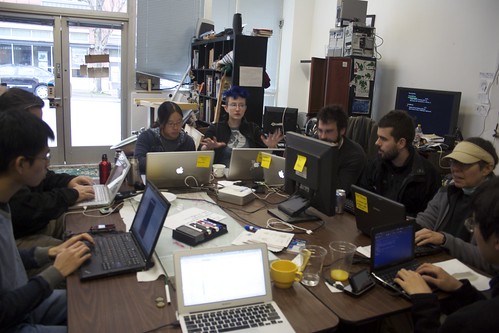Random Hacks of Kindness was the first weekend of December, OpenDoor Hack-A-Thon this past weekend. Many amazing things were built, and we’ll be continuing endeavors on both counts. What I’m going to talk about now though is not the code or the implementation, but the social dynamics and what we can Do Better for hackathons.
The thons that I have participated with have, as a default, been intimidating. I hope this is not everyone’s experience, but it certainly is mine. I have limited coding experience, and a time-crunch competition is no time to show up and say “but I can learn!” I often offer to keep track of online communications, do research, layout order-of-use and menus and the like, and brew coffee. On occasion, while someone is waiting for code to compile or someone else to finish a contingency task, they’ll teach me about what they’ve written. I learn a lot and have a great time.
There is a continuing problem of “the n00b and the clue-by-four”. This is happens when someone shows up with some combination of the following two features : arriving late1 and/or having extremely limited ability2. It is an issue I have yet to see addressed well. Incorporating a better way of guiding efforts of the thons would be beneficial to all participants, n00bs or l33t. So, in talking with James and Jordan and Strand, we’ve been thinking about the following solutions:
- basic document (link to what the event is about, communication channels, documents created for event
- IRC bots (check-in times, auto-answer basic questions, DM those joining the room with above doc, send log of IRC discussion
- gamification (points towards what people should be working on, time allotments for each stage, etc)
So… I’m super excited to start the hackathons at Jigsaw third weekends in 2011. What would you do? What sorts of guidance do you need when participating in a group event where the details evolve as everyone works together, and few people know each other? We’re intending on having classes the Wednesday before, so people feel a bit more capable in their skills, or create a new skillset.
1. Problems and their potential solutions are discussed either before the hackathon or during its first breaths. Courses chosen are based on the skillsets of available people – to include a step which involves skills no one present has based on the hope that someone will walk through the door hours into the event with just that skill would be silly. This means arriving early is essential, ESPECIALLY if you haven’t been participating in the existing dialoge.
2. As stated before, time-crunch competitions are no time to pester people to teach you things, and promising you can deliver something you don’t have the skills for can be detrimental to everyone. Come, hang out, learn more, but temper your ambitions with your abilities.


There needs to be a ‘Dev Manager’ or ‘Project Manager’ whose job exists to A) evaluate the abilities of the team at hand, B) determine the best course, C) keep teams on course, D) onboard late arrivals so they don’t disrupt the people already working.
We’re not talking about a dictator… but someone who can cut down a 2-hour ‘group discussion’ into a quick 15-minute pros?/cons?/decision.
The problem isn’t that there are n00bs, it’s that we’ve provided a pile of clue-by-fours at the door.
You have misdiagnosed the problem. The n00b being hit by the clue-by-four occurs when we haven’t planned an event to accomodate the public, even the amateur portion of the public. Proper event planning means that we have a resource, either a person or a document, that is dedicated to welcoming people to the event itself.
That is, the problem isn’t that there are amateurs, late-comers, or folks we haven’t met before. It’s that we’re hitting anyone with clue-by-fours, ever. It shows a profound disrespect for all participants to excuse one of them being hit by clue-by-fours because they’re an amateur. This is Jigsaw’s Safe Space Agreement: “As a participant at Jigsaw Renaissance, you agree to respect everyone including members, guests, and participants. This respect will extend to everyone regardless of level of experience, level of ability, level of interest, gender, gender expression, sexuality, age, race, creed, color, origin, or personal experience.”
The clue-by-four isn’t lobbed against just those you presume lack technical ability, though that already violates the Safe Space Agreement. I knew I would be late for RHoK, having suffered a head cold for about a week. I informed you beforehand that I wouldn’t be able to show up on time, but I was looking forward to attending. When I arrived, I asked how I could help. I was informed there was coffee. However, there wasn’t coffee. So I cleaned dishes, made coffee, and drank a cup. As an organizer you were obviously busy, so I spent the first hour of the hackathon unable to contribute. My second hackathon wasn’t much better, an unfortunate series wherein no one organizing the event volunteered information relevant to the tasks I was assigned.
It’s an elitist presumption to assume that because someone hasn’t been submerged in your subculture that they are useless. But that’s what’s exactly what presuming that someone new to the group is incapable of contributing. That’s why we call people ‘n00bs,’ to justify being unwelcoming to new-comers.
Also, if on-time is late, let’s set the start time to early.